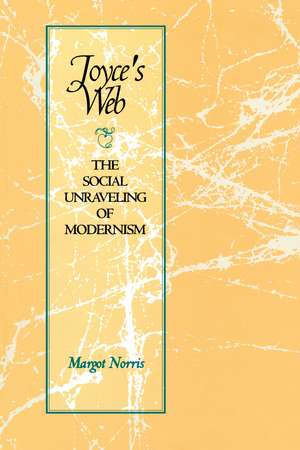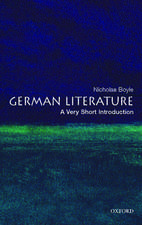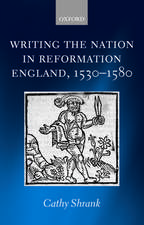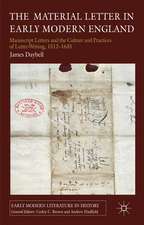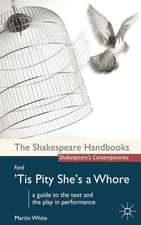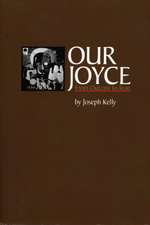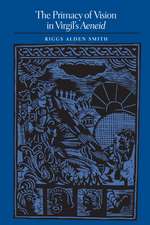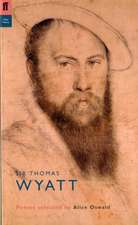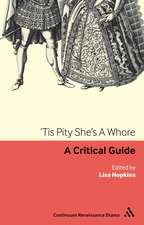Joyce's Web: The Social Unraveling of Modernism: Literary Modernism
Autor Margot Norrisen Limba Engleză Paperback – 15 iul 2009
In sections organized around three mythologized and aestheticized figures in Joyce's works—artist, woman, and child—Norris' readings "unravel the web" of Joyce's early and late stories, novels, and experimental texts. She shows how Joyce's texts employ multiple mechanisms to expose their own distortions, silences, and lies and reveal connections between art and politics, and art and society.
This ambitious new reading not only repositions Joyce within contemporary debates about the ideological assumptions behind modernism and postmodernism, but also urges reconsideration of the phenomenon of modernism itself. It will be of interest and importance to all literary scholars.
Din seria Literary Modernism
-
 Preț: 136.10 lei
Preț: 136.10 lei -
 Preț: 257.06 lei
Preț: 257.06 lei -
 Preț: 271.51 lei
Preț: 271.51 lei -
 Preț: 163.09 lei
Preț: 163.09 lei -
 Preț: 235.38 lei
Preț: 235.38 lei -
 Preț: 199.59 lei
Preț: 199.59 lei -
 Preț: 199.59 lei
Preț: 199.59 lei -
 Preț: 220.91 lei
Preț: 220.91 lei -
 Preț: 208.14 lei
Preț: 208.14 lei -
 Preț: 220.91 lei
Preț: 220.91 lei -
 Preț: 199.59 lei
Preț: 199.59 lei -
 Preț: 307.66 lei
Preț: 307.66 lei -
 Preț: 249.59 lei
Preț: 249.59 lei -
 Preț: 199.59 lei
Preț: 199.59 lei - 18%
 Preț: 608.77 lei
Preț: 608.77 lei - 18%
 Preț: 606.84 lei
Preț: 606.84 lei - 18%
 Preț: 821.08 lei
Preț: 821.08 lei - 15%
 Preț: 473.77 lei
Preț: 473.77 lei - 18%
 Preț: 607.22 lei
Preț: 607.22 lei - 18%
 Preț: 580.69 lei
Preț: 580.69 lei - 18%
 Preț: 577.72 lei
Preț: 577.72 lei
Preț: 195.98 lei
Nou
Puncte Express: 294
Preț estimativ în valută:
37.55€ • 39.53$ • 30.99£
37.55€ • 39.53$ • 30.99£
Carte tipărită la comandă
Livrare economică 23 ianuarie-06 februarie 25
Preluare comenzi: 021 569.72.76
Specificații
ISBN-13: 9780292722552
ISBN-10: 0292722559
Pagini: 255
Dimensiuni: 152 x 229 x 18 mm
Greutate: 0.37 kg
Editura: University of Texas Press
Colecția University of Texas Press
Seria Literary Modernism
Locul publicării:United States
ISBN-10: 0292722559
Pagini: 255
Dimensiuni: 152 x 229 x 18 mm
Greutate: 0.37 kg
Editura: University of Texas Press
Colecția University of Texas Press
Seria Literary Modernism
Locul publicării:United States
Notă biografică
Margot Norris is a professor of English and comparative literature at the University of California, Irvine.
Cuprins
- Acknowledgments
- Abbreviations
- Part I. The Artist
- Chapter 1. Textual Raveling: A Critical and Theoretical Introduction
- 1. Joycean Canonization and Modernism
- 2. Joyce, Feminism, and the Ideologically Self-Critical Text
- 3. Intertexted Weavings
- Chapter 2. Patronage and Censorship: The Production of Art in the Social Real
- 1. Patronage as Communist “Grace”
- 2. Ibsen, Censorship, and Art!’s Social Function in Stephen Hero
- Chapter 3. Stephen Dedalus, Oscar Wilde, and the Art of Lying
- Chapter 4. “Shem the Penman”: Joyce’s Tenemental Text
- 1. Cranly, Materialism, and Art
- 2. Shem as Béte Noire of Modernism
- Chapter 1. Textual Raveling: A Critical and Theoretical Introduction
- Part II. The Women
- Chapter 5. “Who Killed Julia Morkan?”: The Gender Politics of Art in “The Dead”
- 1. Stifled Back Answers
- 2. The Woman as Objet d’Art
- 3. Woman as the Other Woman
- 4. Songs, Romance, and the Social Real
- 5. The Silencing of Female Art
- Chapter 6. Narration under a Blindfold: Reading the “Patch” of “Clay”
- Chapter 7. The Work Song of the Washerwomen in “Anna 139 Livia Plurabelle”
- 1. Samuel Butler and the Desublimation of Myth
- 2. The Social Politics of Washerwomen in History
- 3. Washerwomen’s Working Talk
- 4. Ablution and Absolution
- Chapter 8. Modernism, Myth, and Desire in “Nausicaa”
- Chapter 5. “Who Killed Julia Morkan?”: The Gender Politics of Art in “The Dead”
- Part III. The Children
- Chapter 9. The Politics of Childhood in “The Mime of Mick, Nick, and the Maggies”
- 1. Tea Parties
- 2. Exile
- 3. Home
- Chapter 9. The Politics of Childhood in “The Mime of Mick, Nick, and the Maggies”
- Notes
- Works Consulted
- Index
Descriere
In this revolutionary work, Margot Norris proposes that Joyce’s art critiques modernism’s fundamental concept of the artist as martyr to bourgeois sensibilities by revealing an awareness of the artist’s connections to and constraints within bourgeois soci
